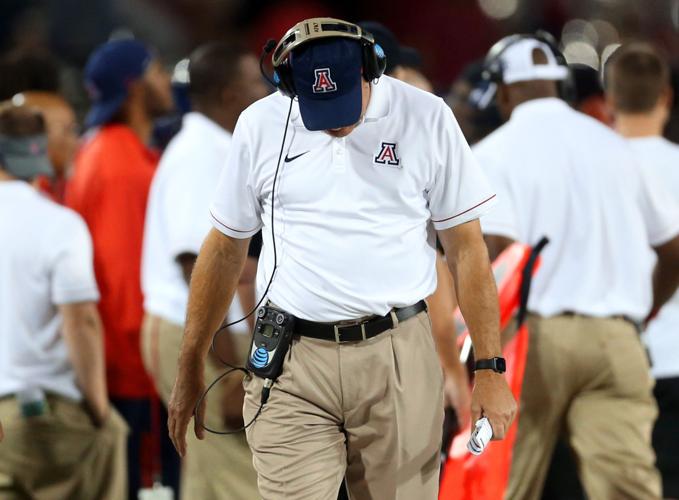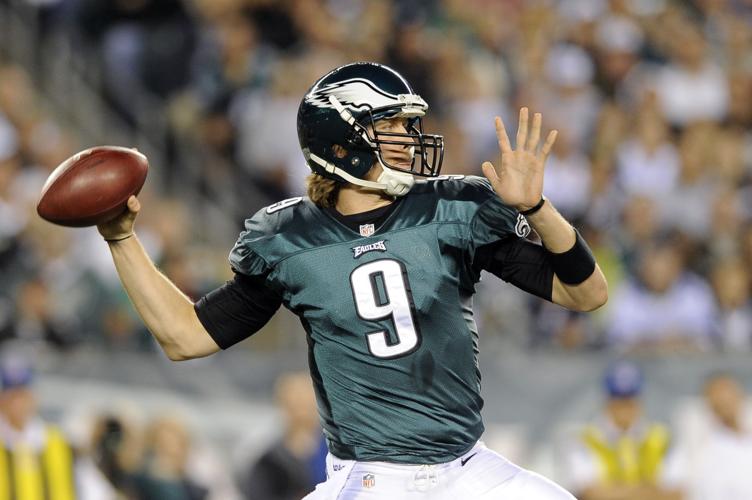The first round of the NFL draft came and went Thursday without an Arizona Wildcat being selected. This was not an unexpected development: Arizona hasn’t had a first-rounder since Antoine Cason in 2008. They are typically the best of the best.
But no Arizona prospect is expected to be taken Friday either. That’s when the second and third rounds take place. And the likely best-case scenario for Saturday — Rounds 4-7 — is two players. It could be none.
Even if two Wildcats get picked late — linebacker Paul Magloire Jr. and receiver Trey Griffey are their top-rated prospects — it won’t be something to brag about in the media guide or in a recruit’s living room. Arizona ranks in the bottom third in the Pac-12 in producing NFL draft picks in recent years and has been trending in the wrong direction.
Only eight Arizona players were picked in the five drafts preceding this one, the third-lowest total in the conference. Only one of those players went higher than the fourth round: third-round selection Nick Foles in 2012.
Over the previous five years, Arizona sent 15 players to NFL teams via the draft. That total tied for fourth-most in the Pac-12 and included six players taken in the top three rounds.
UA coach Rich Rodriguez, who’s entering his sixth season, is well aware of his program’s recent dearth of draft picks. He was asked if it concerns him.
“We’re more concerned about our guys enjoying the experience and winning games,” Rodriguez said. “But it’s easier to win when you have a lot of draft picks. We’ve got to recruit better. It starts with the head coach.”
Recruiting missteps are the main reason that Arizona slumped the past two seasons, bottoming out at 3-9 in 2016. Rodriguez saw where his program was headed the previous year and retooled his staff, hiring younger coaches on defense and bringing Chris Singletary aboard as director of recruiting.
Typically, a program’s win-loss record mirrors its output of pro players. It’s no coincidence that Colorado, which was down for years until last season, was tied for the fewest picks produced (five) by Pac-12 schools over the past five drafts — while surging Stanford had the most (24).
The problem for Arizona is the causality loop this creates: Because the school isn’t producing NFL draft picks, it’s hard for UA coaches to sell that possibility to recruits with NFL aspirations. Which is to say just about every recruit.
“They all want to go to the NFL,” Rodriguez said. “If that’s not their dream, then we’re recruiting the wrong guys, because that’s who our competitors are recruiting.”
The pitch from a college coach to a high school recruit is multilayered, but one of the top layers for Power Five schools is the opportunity to pursue a career in pro ball. Arizona’s recent track record in that regard puts the school at a disadvantage compared to many of its direct competitors.
“It matters for sure,” Pac-12 Networks analyst Yogi Roth said. “Every student-athlete who signs on signing day thinks they’re going to the NFL, and they should.”
Recruits want to know their path to starting and starring. They want to win games. They want opportunities to grow as players and people.
“But also,” Roth said, “how can you get me to a place where I can feed my family and change my life?”
Greg Biggins, national recruiting analyst for Fox Sports and Scout.com, said the NFL draft is “one of the biggest selling points these college coaches have. But is it the ultimate deal breaker? No.”
Biggins said other factors are just as important, perhaps more so: playing time, relationships with coaches, comfortability on campus. When informed of Arizona’s lack of draft picks over the past five years, Biggins was surprised.
“I don’t feel like their recruiting has been that horrible,” he said.
A lot goes into why a highly rated recruit doesn’t develop into a legitimate pro prospect, including poor coaching, wrong scheme fits and injuries.
“Luck, good and bad, definitely plays a role,” Biggins said, “whether it be injuries to certain players or guys who were overrated when they came in.”
Arizona has plenty of recent examples of touted recruits who didn’t pan out for one reason or another.
Jamardre Cobb came to Tucson as a four-star linebacker and is currently a seldom-used fullback. Marquis Ware, his high school teammate, barely played before medically retiring. DaVonte’ Neal, who transferred from Notre Dame, shifted from receiver to cornerback, lost his starting job last year and is a long shot to be drafted this weekend.
“Cobb and Ware, these were guys who had double-digit offers,” Biggins said. “DaVonte’ Neal was a guy we thought would be three-and-out, a special talent.
“It goes in cycles. Right now, it’s a down cycle for Arizona.”
The question is whether Arizona can get out of it, and how quickly. The initial forecast isn’t much sunnier for next year’s draft, but Roth believes the past two recruiting classes feature NFL talent — which would validate Rodriguez’s recent reforms. Roth cited class of 2016 offensive lineman Michael Eletise as a player with a pro body and pro potential.
“To say we’re going to have as many draft choices as Alabama or Florida State or Clemson, it probably ain’t gonna happen,” Rodriguez said. “We don’t have that brand name. But we can get more than what we’re having now.”
Rodriguez didn’t mention USC, the flagship program of the Pac-12 South. Although they are a conference rival, it’s unrealistic to think the Wildcats can become an NFL pipeline on par with the Trojans. USC tied for the second-most picks among league schools over the past five years — and from 2007-11 produced more selections (42) than any Pac-12 school over the past 10 years.
But experts believe Arizona should be able to produce as much NFL talent as Arizona State, Oregon State and Utah — all of which had more players picked in the five drafts leading up to this one. Arizona’s current struggles, they said, do not preclude it from becoming a steady supplier of pros.
“The reputation of RichRod is still ridiculously impressive,” Roth said. “Players still want to play for him.
“To think Arizona is going to get recruiting classes with bona fide NFL bodies like USC or Stanford, that’s not accurate. They have to go find players that are really smart and really athletic.
“But I don’t think that prohibits an NFL prospect from going there. I don’t think you can say Arizona can’t produce NFL talent. If you say that, you’re clueless.”





